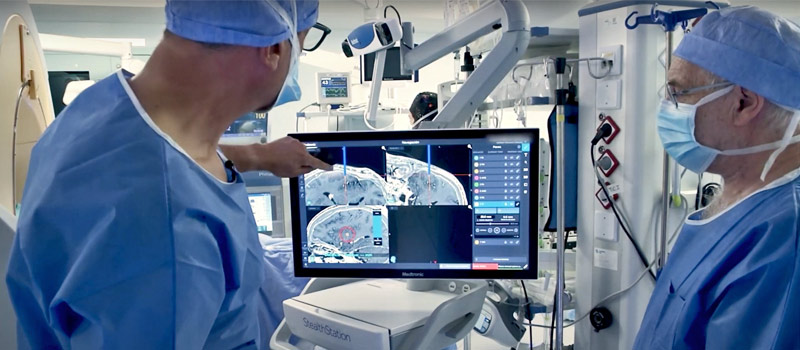3 March, 2021
New laser treatment for drug-resistant epilepsy

The Hospital Clínic Group has recently acquired new interstitial laser equipment for its Epilepsy Unit. This minimally invasive technology can be used, among other things, to treat those types of epilepsy that do not respond to conventional pharmacological treatments and which account for 30% of all patients with epilepsy.
“With this new equipment, we can perform highly selective cuts on the epileptogenic foci, which are the origin of epileptic seizures, in which conventional microsurgery can be too invasive”, explains Dr Jordi Rumià, a neurosurgeon at barnaclínic+ and coordinator of the Adult and Paediatric Functional Neurosurgery Programme at the Hospital Clínic de Barcelona.
“With the new interstitial laser, we can perform highly selective cuts on the epileptogenic foci, which are the origin of epileptic seizures, in which conventional microsurgery can be too invasive”
New laser for epilepsy: Greater precision and safety
In epilepsy surgery with the new interstitial laser, a three-dimensional image-guided robotic arm inserts a thin optical fibre into the diseased tissue. Through this fibre, and by means of the laser, the area where the epileptic seizures start is eliminated very non-aggressively, without injuring the surrounding healthy brain tissue. MRI is used to guide the whole process, offering real-time control and high safety levels. All this translates into less aggressive surgery conducive to faster post-operative recovery and a shorter hospital stay.
This new laser for epilepsy is indicated for patients with focal epilepsy in whom the seizures begin in small, well-defined lesions, never more than 3 centimetres wide. It is also indicated for areas that are risky to access through conventional microsurgery.
“The main advantages are that this procedure is performed through a small cut in the skin, preserving the healthy, functional tissues surrounding the lesion. Also worthy of note is that it can be performed during a hospital stay, as well as rapid and complete recovery in a short time,” says Dr Pedro Roldán, functional neurosurgeon at barnaclínic+, specialist in Movement Disorders and Epilepsy.
“The main advantages of using laser for epilepsy are that surgery is performed through a small cut in the skin, which is carried out while admitted to hospital, and that recovery is faster “
The interstitial laser, also for the treatment of other conditions
Although the main indication of this new laser is for the treatment of epilepsy, this is not its only function. It can also be used in other conditions, as Dr Jordi Rumià explains: “It can also be used in tumour nodules or deep-seated cavernous angiomas. It is also an alternative for those patients who opt for minimally invasive surgery”.
About epilepsy
Epilepsy is one of the most common neurological diseases, which makes sufferers overly agitated or irritable due to changes in brain tissue. This causes brain activity to become abnormal, leading to seizures or periods of unusual behaviour or sensations. It can sometimes even lead to loss of consciousness.
In Spain, it is estimated that six out of every hundred people suffer from epilepsy, which affects both men and women of any age, ethnicity or geographic region. Up to 20% of people with epilepsy will have recurrent seizures.
70% of epilepsy patients respond adequately to pharmacological treatments to control their disease. The remaining patients, whose epilepsy is untreatable with medication, require surgery or Deep Brain Stimulation. This means that there are around 100,000 patients in Spain for whom these alternative treatments should be considered.
The new interstitial laser for epilepsy is particularly indicated for cases of epilepsy resistant to pharmacological treatment, which account for 30% of all cases
LEADERS IN FUNCTIONAL NEUROSURGERY
The Hospital Clínic Group has extensive experience in the treatment of patients with drug-resistant epilepsy, the result of multidisciplinary teamwork spanning more than 25 years. This has earned it CSUR accreditation of excellence as a referral centre in refractory epilepsy and qualified it to form part of the European Network for Rare and Complex Epilepsies (EPICARE).



